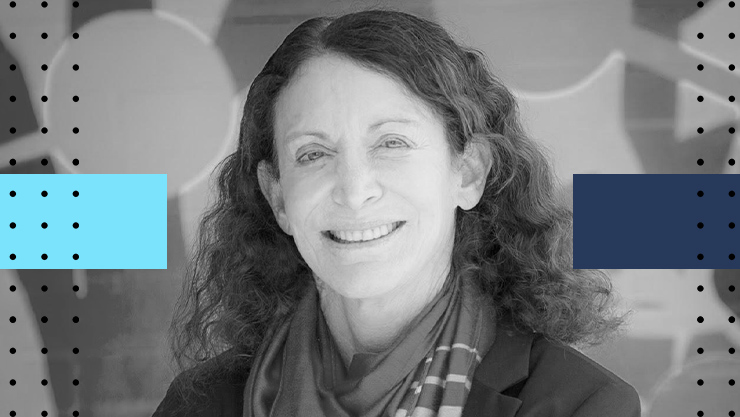
A Connected and Citizen-Centered City: Lessons from Brussels
with Mary Odile LognardMary Odile Lognard shares the approach that she and her team have taken to enable the digital transformation of the City of Brussels.

This is a show for anyone who cares about using digital approaches in the public sector to deliver better outcomes. We explore stories from around the world, where public servants have been successful at driving change. We meet the people behind the stories, to hear their first-hand experiences and lessons learned. Throughout the series we discuss technology and trends, as well as the cultural aspects of making change happen.
Join host Olivia Neal as she meets Mary Odile Longard, the CEO of i-CITY. Marie Odile shares the approach that she and her team have taken to enable the digital transformation of the City of Brussels. She introduces BRUCE, the new omni-channel platform used by the city, explains the impact of this work on citizens and employees, as well as her lessons for others.
Click here for transcriptof this episode.
Olivia Neal [host] | LinkedIn
Marie Odile Lognard [guest] | LinkedIn
Learn more about I-CITY and BRUCE on their website: Home | i-CITY (brucity.be)
Microsoft Public Sector Center of Expertise for more information and transcripts of all episodes
Discover and follow other Microsoft podcasts at news.microsoft.com/podcasts.

Episode summary
Mary Odile Lognard shares the approach that she and her team have taken to enable the digital transformation of the City of Brussels. She introduces BRUCE, the new omni-channel platform used by the city, explains the impact of this work, as well as her lessons for others.
A Connected and Citizen-Centered City: Lessons from Brussels
Mary Odile Lognard shares the approach that she and her team have taken to enable the digital transformation of the City of Brussels. She introduces BRUCE, the new omni-channel platform used by the city, explains the impact of this work, as well as her lessons for others.
The City of Brussels
Mary Odile Lognard is the CEO of i-CITY, which is the IT solutions and services provider for the City of Brussels. Lognard explains that the City of Brussels is the largest of the 19 municipalities in the region, with almost 200,000 people of about 180 nationalities. Her team has the mission of supporting the city in its transition to being a smart city while maintaining existing services and solutions.
The need for a digital approach
Lognard shares that making technological jump and implementing a digital approach became a priority about five years ago. “Brussels was facing significant population growth since the early 2000s, creating a high pressure on its administration services, with long queues, long waiting times, creating frustrations for the citizens, and at the end, a disconnection between citizens and its administration.”
“At the same time, the phasing out of the older technology required smart solutions. The administration was old-fashioned, paper-based, not very accessible for its citizens. The world has been changing, people have been changing, people have been evolving, they want everything anywhere, anytime, any devices.”
“We wanted a connected and citizen-centered city, accessible for all, bridging the digital divide, participative and accessible. That’s why we started this huge digitalization process.”
Introducing BRUCE
Lognard describes the BRUCE platform, an omni-channel citizen platform at the heart of the digital transformation. She explains “BRUCE, is an omni-channel citizen platform with the aim of managing products and services for all Brussels citizens, individual businesses, and also visitors, commuters.”
“The platform is a stable set of various components, and Microsoft building blocks. It’s stable, it can evolve. And at its core, there is a citizen relation management tool called a CRM that provides a 360-degree view on the citizens and employees.”
“And at the periphery, we have various components, enabling digitalization, citizen-secure identification, and links to incoming and outcoming mail, electronic signature, electronic payments that are linked, document generation, et cetera.”
“And all this is complemented by a knowledge database that contains all relevant information for both the citizens and the employees. This integration platform is open, secured, it’s in the cloud, and it’s adaptable.”
Positive impacts for citizens and employees
Lognard shares that the BRUCE platform optimizes the relationship between citizens and the administration, delivering the same experience regardless of the channel chosen by the citizen. The platform has digitalized and made accessible online up to 20 services, saving citizens time and reducing pollution. The platform has changed the relationship between citizens and their local administration, with up to 40% fewer in-person visits than before, and with 50% of transactions happening outside of traditional working hours. With the steady increase in digital services, Lognard hopes to reach 75% fewer in person visits, as people are able to complete these online.
Lognard shares that the digital approach has also had positive impacts for staff “the work environment has changed and drastically improved. The quality of their work is being improved as well. It’s becoming more interesting as they can now focus on tasks that cannot be done by your machine, avoiding menial tasks. It’s also allowing them to work in a more flexible way.”
Lognard explains that the city has taken steps to ensure that everyone has access to the services offered by the platform. Using the online system is not compulsory, and the physical experience remains possible and available for all. The city also has self-service computers available for the public, digital stewards to help people, and training courses for people with IT challenges. A chatbot is planned in the very near future, available in different languages, to help people navigate.
Building a team for successful digital transformation
Lognard shares that change management was a very challenging point in the transition to a more digital approach. The staff had to be involved from the very beginning and made aware of the need to change. The front desk employees were involved in the change process and in the design of the digital system to make sure that it was able to deliver to the needs of the users “As we all know, technology alone is not the solution. If the analysis done at the beginning of a project is not accurate, you have a lot of last-minute changes to deal with.”
Lognard advises that building a team is essential for a successful digital transformation “You need to invest in your people. Our team have a deep knowledge of the city processes and practices. This takes time to build and requires very sharp analytical skills.”
Lognard is positive about the opportunities for future integration of AI and IoT, strengthening links between the city and different public and government agencies, while continuing to perfect the present systems, “it is a second chapter is still to be written in the coming months and years.” Lognard concludes, “The future is always under construction.”
To find out more:
- Learn more about I-CITY and BRUCE on their website
- Find out more about how Microsoft supports cities
Listen to this episode on any of these podcast platforms:
About the Center of Expertise
Microsoft’s Public Sector Center of Expertise brings together thought leadership and research relating to digital transformation in the public sector. The Center of Expertise highlights the efforts and success stories of public servants around the globe, while fostering a community of decision makers with a variety of resources from podcasts and webinars to white papers and new research. Join us as we discover and share the learnings and achievements of public sector communities.
Questions or suggestions?











